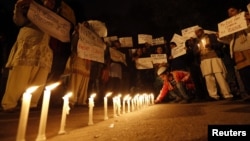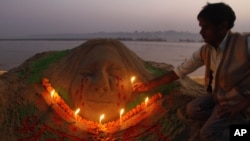NEW DELHI —
One month after the brutal gang rape of a 23-year-old woman in New Delhi, there is a new awareness about sexual violence against women in India and a growing debate about women's rights. Widespread protests by young Indians have turned the spotlight on discrimination that women face in the country.
As protests in New Delhi carried on for days following the brutal gang rape of a physiotherapy student last month, many people were surprised by the massive public clamor.
Young, urban, educated, middle-class Indians demanded not just stringent punishment for the guilty, but also a change in how women are treated in India. And, they publicized an issue that has seldom made news: sexual violence against women.
2013
Ranjana Kumari, who heads New Delhi’s Center for Social Research, said the anger expressed by young people is unprecedented.
“Whenever crisis like this happened or crime, we have never seen other people in society coming forward, in fact only women’s groups and organizations, so far, have been screaming on top of their voices to do something and ask for justice," said Kumari.
She said, "Today, this cry for justice has gone across to everyone, everybody is totally moved, motivated and hopefully this kind of social outcry will continue. So, I am very hopeful that the baton has been given over to young people.”
Sexual violence is a problem across rural and urban India. Rape is seldom reported in villages because of the social stigmatism of such violence. Even in relatively modern cities, outmoded attitudes continue. Many blame sexual harassment on the influence of "Westernization" on traditional Indian culture. Hence, there are voices that often call on women to dress modestly or not stay out late to avoid becoming victims of crime such as rape.
Last month's gang rape may be hardening such attitudes. Several village councils have banned girls from using mobile phones or dancing at weddings. In Delhi, police have advised women to go straight home from their college classrooms, provoking an outcry.
But an urban, educated middle class is leading the demand for a change in mindset toward women and their safety. Some said women wearing short skirts, shorts or midis are often stared at,and that women do not feel safe in New Delhi. Others said this type of attire provokes men. And there were those who said men and the mindset that puts them above women need to change.
Sexual violence is not the only concern. Women face widespread discrimination. Young girls are often given less food and less education than young boys. A preference for sons over daughters has led to a skewed gender ratio because of the practice of aborting the fetus of a girl child.
Ranjana Kumari said violence targeting women is a problem because social attitudes remain outmoded in much of the country. She added that "there is a lot of violence at home. Every third woman reports violence according to Indian Family Health Survey."
"We have a mentality which in some way or the other is trying to control women, targeting women," she said. "The correction has to start from family and society. Women have to be given the respect and their dignity has to be honored and that is the only way by changing social mindset we can control crime.”
Sociologists said recent street protests were not just about the brutal gang rape. They said they also reflect growing frustration and anger in a country where a huge, educated middle class has emerged, but governance remains poor, police are insensitive and a slow legal system often results in delayed justice.
Sociologist Dipankar Gupta in New Delhi said the rape was an inflection point. “The rape acted as a kind of tipping point," he said. "It was on top of a lot of grievances accumulating over the years. In my view, what happened on that fateful night, just precipitated matters."
"There is a gradual alienation which has more or less solidified between the so-called political class and rest. You don't have an organized movement, what you really have is an inarticulate cry of the people who don’t know which way to go,” he said.
For now, that cry is focused on the issue of rape and sexual violence. Throughout the country, cases that rarely received front-page coverage in the news are getting more attention. But activists warn there is a long path ahead before there is any real change in attitudes toward women.
As protests in New Delhi carried on for days following the brutal gang rape of a physiotherapy student last month, many people were surprised by the massive public clamor.
Young, urban, educated, middle-class Indians demanded not just stringent punishment for the guilty, but also a change in how women are treated in India. And, they publicized an issue that has seldom made news: sexual violence against women.
Brutal Gang Rape Shocks India
Brutal Gang Rape Shocks India
2012
- December 16: Victim is gang-raped and beaten on a bus in New Delhi
- December 20: Protests intensify and spread
- December 29: Victim dies in Singapore hospital
2013
- January 2: Five suspects charged with rape and murder
- January 17: Case against five suspects sent to special fast-track court
- January 23: Government panel calls for new sexual assault laws
- January 28: Panel rules sixth suspect will be tried as a juvenile
- February 2: The five accused being tried in the fast-track court plead not guilty
- March 11: Indian police say one of the suspects killed himself in jail
- August 31: Juvenile suspect found guilty
- September 10: Remaining four suspects found guilty
“Whenever crisis like this happened or crime, we have never seen other people in society coming forward, in fact only women’s groups and organizations, so far, have been screaming on top of their voices to do something and ask for justice," said Kumari.
She said, "Today, this cry for justice has gone across to everyone, everybody is totally moved, motivated and hopefully this kind of social outcry will continue. So, I am very hopeful that the baton has been given over to young people.”
Sexual violence is a problem across rural and urban India. Rape is seldom reported in villages because of the social stigmatism of such violence. Even in relatively modern cities, outmoded attitudes continue. Many blame sexual harassment on the influence of "Westernization" on traditional Indian culture. Hence, there are voices that often call on women to dress modestly or not stay out late to avoid becoming victims of crime such as rape.
Last month's gang rape may be hardening such attitudes. Several village councils have banned girls from using mobile phones or dancing at weddings. In Delhi, police have advised women to go straight home from their college classrooms, provoking an outcry.
But an urban, educated middle class is leading the demand for a change in mindset toward women and their safety. Some said women wearing short skirts, shorts or midis are often stared at,and that women do not feel safe in New Delhi. Others said this type of attire provokes men. And there were those who said men and the mindset that puts them above women need to change.
Sexual violence is not the only concern. Women face widespread discrimination. Young girls are often given less food and less education than young boys. A preference for sons over daughters has led to a skewed gender ratio because of the practice of aborting the fetus of a girl child.
Ranjana Kumari said violence targeting women is a problem because social attitudes remain outmoded in much of the country. She added that "there is a lot of violence at home. Every third woman reports violence according to Indian Family Health Survey."
"We have a mentality which in some way or the other is trying to control women, targeting women," she said. "The correction has to start from family and society. Women have to be given the respect and their dignity has to be honored and that is the only way by changing social mindset we can control crime.”
Sociologists said recent street protests were not just about the brutal gang rape. They said they also reflect growing frustration and anger in a country where a huge, educated middle class has emerged, but governance remains poor, police are insensitive and a slow legal system often results in delayed justice.
Sociologist Dipankar Gupta in New Delhi said the rape was an inflection point. “The rape acted as a kind of tipping point," he said. "It was on top of a lot of grievances accumulating over the years. In my view, what happened on that fateful night, just precipitated matters."
"There is a gradual alienation which has more or less solidified between the so-called political class and rest. You don't have an organized movement, what you really have is an inarticulate cry of the people who don’t know which way to go,” he said.
For now, that cry is focused on the issue of rape and sexual violence. Throughout the country, cases that rarely received front-page coverage in the news are getting more attention. But activists warn there is a long path ahead before there is any real change in attitudes toward women.










